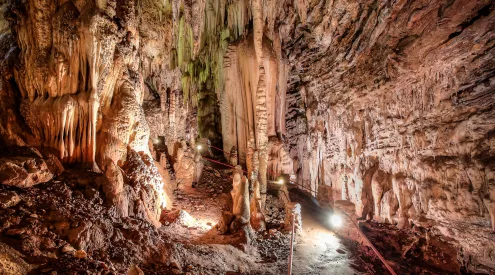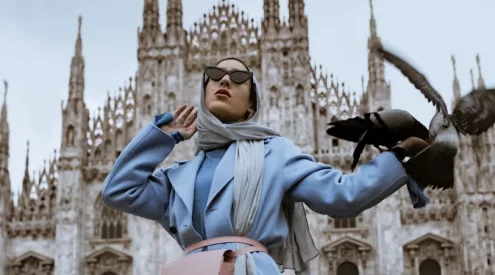Plan a feel-good, do-good journey along the Wild Coast from East London to see how Fair Trade establishments in the rural Eastern Cape are doing.

Beers in hand, we watched the sun go down from this Coffee Bay viewpoint overlooking the Indian Ocean.
As a child, I would always shut my eyes tightly as we drove on the winding N2 to my grandmother’s homestead in Nqamakwe, in the Amathole District of the Eastern Cape. According to my mother, the first time I set eyes on the steep road approaching Butterworth, I began to cry in fear that we would never make it back home. That was 20 years ago. Now I found myself behind the wheel on the same road, heading to the Wild Coast at sunrise, to find out more about Fair Trade South Africa’s links with tourism businesses in the area.

Coffee Bay. Image by Ondela Mlandu
In awe that I had just driven through Qunu, the rural village where Mandela grew up, I passed the villages of KwaJali, Mancam and Ngcwanguba, while using the ocean as a guide to my destination. The drive seemed neverending (and the potholes slowed me down) but the weather was pleasant, there were few cars on the road and the scenery made up for it – turquoise rondavels dotting green hills as far as I could see. In the past 12 months, many of these villages were given access to fresh water and electricity for the first time. Most people who come to the Wild Coast pick a spot and stay there, not least because access to places is tricky, and it’s easy to get lost once you’re off the N2 and some road conditions are bad. But I had come to journey through the Xhosa heartland and reconnect with a simpler way of life, and I knew my visit would be welcomed by the communities.
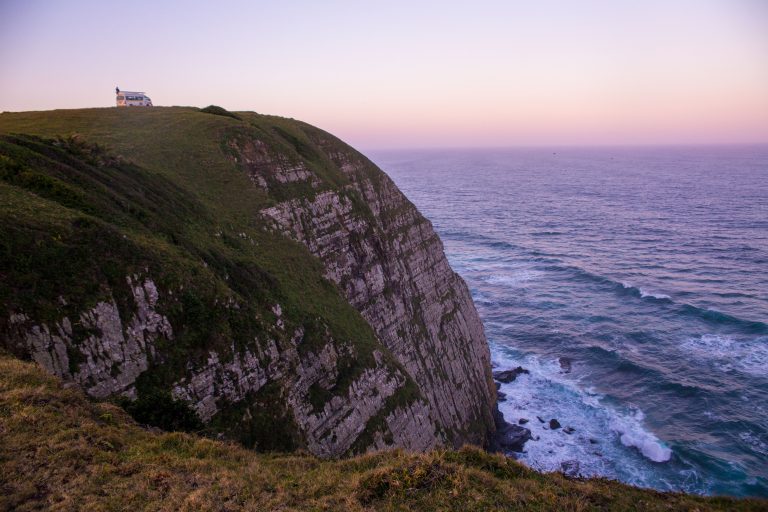
Coffee Bay has many sundowners spots and this one in particular shows off the Indian Ocean perfectly. Image by Ondela Mlandu
Growing crops and herding stock is the main livelihood here, but several tourism based businesses have had a positive impact on the villages and allowed locals to prosper. Many people here have only a basic education, but working hand-in-hand with lodges and backpackers has instilled a sense of pride and independence. My first destination, Bulungula Lodge, set up by Dave Martin in 2004 is now 100 per cent owned and managed by the Nqileni community. The lodge, comprising Xhosa huts dotted on a hillside above the Xhora River mouth, melds seamlessly with the adjacent village, and there are no fences or locked doors. It felt safe, and that I was part of the community. I spent much of my time drifting around the village, chatting to people, getting a sense of what life is like, and visited ‘mamas’ of the community who run the Women Power Project – guests can help by working in the maize field, making mud bricks and walking to the river to fetch water. I also met Mkhuseli Mdibanto who takes guests fishing along the coast just the way his father taught him.
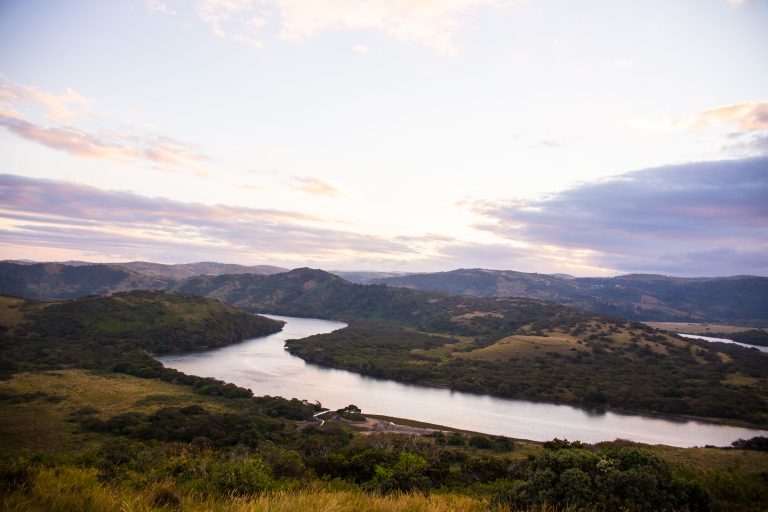
The Wild Coast is colourful and this shows in its people, the exquisite beaches, waterfalls and famous landmarks. Image by Ondela Mlandu
After this rural paradise, I headed for the famous traveller hub, Coffee Bay. In addition to the twisty-turny roads over hills, cattle and goats roam freely in these parts – and they’re stubborn about making way for vehicles. In the Mqanduli area, I came across a herd strutting about on the road like Victoria’s Secret models, forcing me to slam on brakes. I hooted. They refused to budge. Eventually I was rescued by a bakkie flying past, hooting and barely slowing down as the animals scattered. Coffee Bay’s Coffee Shack was set up by David Malherbe, who spent years travelling the world and surfi ng. (Not surprisingly, surfing is a big deal here, and a good place to learn.) The community has a 30 per cent share in this backpacking business and many locals are employed; manager Nomandla Gxakatha has been there for 16 years. She told me that staff are encouraged to travel and to experience life outside the village. ‘Three years ago I was given tickets to go to Zimbabwe, Malawi and Zambia for a month. I didn’t use a cent from my pocket. While I was travelling, Coffee Shack was looking after my family at home.’ Coffee Bay is the closest you’ll get to a town in these parts. It also offers the easiest access to the landmark that brings many people to this part of the coast: the iconic rock formation, Hole in the Wall.
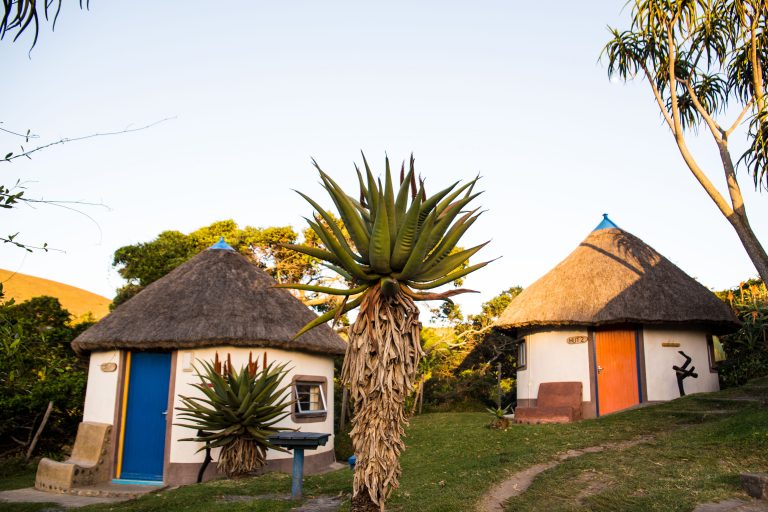
The rural Transkei region of the Wild Coast includes the pretty seaside villages. This image was taken at Coffee Shack Backpackers. Image by Ondela Mlandu
I joined a group of travellers from Canada, England and Taiwan for the three-hour hike there. The first leg was daunting with steep hills. Cattle and goats munched on the grass at the edge of cliffs overlooking the Indian Ocean. All along the trail were the most incredible views. As I sat on a rock at one, trying to catch my breath, a mama from the village, who obviously walked this route daily, overtook me. When I eventually arrived at Hole in the Wall, I was rewarded with a cheese-and-tomato toastie, made on an open fire by our guide.

The Wild Coast is a 250 kilometre stretch of rugged and breath taking coastline that stretches from East London to the border of KwaZulu Natal. Image by Ondela Mlandu
Soon, it was time for me to head out again, to a pair of lodges on either side of the Mdumbi River in the northeast. Once again, this entailed heading inland and then turning back to the sea. ‘After the police station, you take the first left on the Mdumbi gravel road,’ a local advised. In this part of the world, GPS is not your friend – it’s best to get directions from locals. The hills were beautiful and rugged, with the odd roadside spaza shop. I knew I was close when I could smell the sea again.

Regardless of where you hike in Coffee Bay, the views will amaze you. Image by Ondela Mlandu
From Mdumbi Backpackers it’s a short walk to the beach, which is a surfer’s haven. I met a group of avid Aussies who’d come to ride the waves in this remote corner. Tshani village is close by. The community owns 50 per cent of the backpacking business and activities are run by locals – including surfIng lessons by Machi Gebegana. I popped in at the Mdumbi Education Centre, where visitors are welcome to read to or play with the children.

The rock formations around at the Hole in the Wall epitomise the power of Mother Nature to form geographical masterpieces. Image by Ondela Mlandu
Guests can also get their hands dirty working in the village gardens. I really enjoyed the meals at Mdumbi Restaurant – guests share a long communal table, which creates a wonderful atmosphere for conversations with people from all around the world. Although Swell Eco Lodge is just across the river from Mdumbi Backpackers, it takes an hour or more to get there by road. As I’d learnt by now, patience is key due to ubiquitous cows on the road and potholes. The lodge, up on a hillside, was diff erent to the other places I’d stayed at – it’s more modern and upmarket, in a fenced yard with a security gate.

Swell Eco Lodge. Image by Ondela Mlandu
My sea-facing rondavel was traditional on the outside but had chandeliers, artwork and an en-suite shower. Owners Justin and Leigh-Ann Saunders have been here for eight years. When they originally wanted land for their business, they had to negotiate with the chief and his headman. Once approved, the Saunders family was welcomed into the community with a celebration. The local community doesn’t have a share in Swell Eco Lodge but it does own the land, and the lodge owners focus on community upliftment. Every quarter, they meet up with the village committee to see how they can assist them. This is, I realised, such an important part of life on the Wild Coast – hospitality, ubuntu and a sense of community is key. When you’re so far away from the rest of the world, it’s vital to help and support each other. On my final morning I slept in a little. I was in no hurry to return to the city. After going back to basics for a few days, I knew what it meant to live simply, and it felt good. Knowing that paying to have that privilege improves other people’s lives felt even better.
Where your money goes
The lodges I stayed at focus on education, community upliftment and health. Among other things, they offer scholarships and school feeding schemes, have upgraded local clinics and trained people to make crafts. They supply clean drinking water, do daily hospital runs and sponsor prizes for children’s sports teams. Three of the lodges – Bulungula, Coffee Shack and Mdumbi – are part of the Fair Trade Travel Pass scheme. You could start your journey at Buccaneers in Cintsa, another Fair Trade establishment; or even tag on a journey to the Drakensberg, to Sani Lodge Backpackers, one of SA’s oldest Fair Trade-accredited lodges (read about it at getaway.co.za). Fair Trade focuses on eco-friendly, socially responsible, ethical businesses, where you can be sure your money is used for the greater good.

Image by Ondela Mlandu
Day by day
Day 1 & 2: East London to Bulungula
Distance 278km
Allow 5 hours
From East London, take the N2, past Idutywa and Butterworth. There are roadworks near Mthatha. Take the Coffee Bay turnoff before Mthatha. After 50km, turn right at the sign for Zithulele Mission Hospital. After 16,5 km, turn right at the sign for Bulungula. Follow the dirt road for 9km (ignore the left turn after 5km). After the face-brick school on your left, you will reach a T-junction – turn left, drive for 4km (ignore the right turn after 1km) until you reach the shop with the big wall. Turn left at this junction. After 1km you will see the signs to Bulungula Lodge. 4×4 advised when wet.
Day 3 & 4: Bulungula to Coffee Bay
Distance 56km
Allow 2 hours
Have pancakes for breakfast before departing. You can retrace your route back to the N2 and continue towards Mthatha, taking the Coffee Bay/Mqanduli exit. Or take a short back-road route – ask the lodge for directions. Once you pass the police station in Coffee Bay, continue until the end of the road and cross the bridge to Coffee Shack backpackers. Visit the Ikhaya Labantwana Montessori and hike to Hole in the Wall and/or Mapuzi Caves and Cliffs.
Day 5 & 6: Coffee Bay to Mdumbi River
Distance 53km
Allow 2 hours
Heading out of Coffee Bay towards Mthata, take the second right-hand turn (signed Mdumbi/Umdumbi) onto a gravel road. Cross the Mthatha River and keep straight until the T-Junction, which has a signboard to Mdumbi Backpackers/Swell Eco. Take a left for Mdumbi Backpackers– follow the dirt road for 10km, passing a spaza shop on the left. Get there in time for sunset on Mdumbi Beach. To get across the river to Swell Eco Lodge, retrace your route to the T-junction. Take a right and then drive 7,6km until you see the next Swell Eco sign. Turn right and stay on this road for4,3km until you reach a fork in the road – keep right. Follow the road for 600m. Take the second turning left, and follow the road for 2,7km until you reach Swell Eco Lodge.

Image by Ondela Mlandu
Directory
1. Bulungula Lodge. There are 10 traditional Xhosa rondavels here – five are dorms, the other five private rooms, plus tents on platforms in the coastal forest. Guests share bathroom facilities. Meals cost from R30 for breakfast to R80 for dinner, but guests can self-cater. Rooms from R480 for two, tents from R450 for two. 0475778900
2. Pancake sunrise. Time your trip to be at Bulungula Lodge on a Wednesday morning to enjoy pancakes with coffee or tea on a dune as you watch the sun rise. R60 (Bigger groups can request this treat on other days.) Booking is essential. 0475778900
3. Coffee Shack Backpackers. A great spot for socialising, it includes Babalaza Bar & Restaurant (meals from R25–R75, with a free dinner on Sunday nights). Surf lessons are R60 for a two-hour session (wetsuit and board included). The rondavels, accessed across the tidal Bomvu stream, are quieter. R450 for two (shared bathrooms) or R560 for two (private en-suite). Self-catering is possible. 0475752048
4. Ikhaya Labantwana Montessori School. Started with only 15 children being taught in a small rondavel. Today there are 60 children. Remember to pack some stationery to donate. Coffee Shack runs a shuttle on Thursdays for guests to visit the school (part of the Mapuzi Caves and Cliff s tour). 0827053408
5. Hole in the Wall. It’s a wonderful day hike, nine kilometres one way. Apart from cows and goats, you could spot dolphins (and whales in season). Go with a guide from Coffee Shack (R100per person), which includes lunch and shuttle back to the backpackers. 0475752048
6. Mapuzi Caves and Cliffs. The hike takes about two hours return. Inside the cave is a natural rock bath, about the size of a Jacuzzi, which is filled with warm seawater. You can also jump off the cliff (14m high) into a rock pool. All the local backpackers offer daily trips here, but it’s cheapest from Coffee Shack. R100 per person.
7. Mdumbi Backpackers. This place is the closest to the sea. The onsite cafe serves meals, but for drinks the staff will send you to support the local shebeen. There’s a view tower for sundowners, a private deck in the forest and a movie lounge. Rondavel rooms are R380 for two, safari tents R360 for two. Self-catering is possible. 083-461-1834
8. Mdumbi Beach. This is one of the loveliest I’ve been to. It’s secluded, charming and surrounded by milkwood trees. You’ll find surfers from all over the globe here. Surfboards are R80 to rent, R100 for lessons.
9. Mdumbi River. The drive from Mdumbi Backpackers to Swell Eco Lodge gives the best view of the river – time it for late afternoon to get a selfie with the sunlight glistening over the water. Swell Eco Lodge offers day trips to enjoy the river. You can go by horseback or kayak (R750 per person) or on a fishing excursion (R500 per person).
10. Swell Eco Lodge. Each of the eight rondavels has two units sharing a fully equipped kitchen. Each unit has a braai area and deck with sea views. There isn’t a restaurant here, but a small shop selling basic supplies. There’s also a fabulous new pool deck (it’s quite a walk to the beach). From R450 per person. 0849433947
Words and images by Ondela Mlandu







